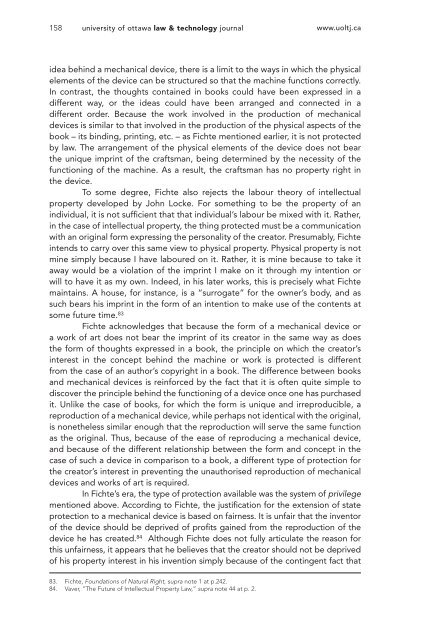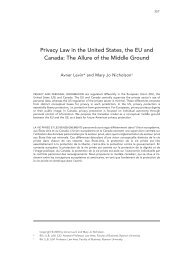Commentary on Fichte's “The Illegality of the Unauthorised ... - uoltj
Commentary on Fichte's “The Illegality of the Unauthorised ... - uoltj
Commentary on Fichte's “The Illegality of the Unauthorised ... - uoltj
Create successful ePaper yourself
Turn your PDF publications into a flip-book with our unique Google optimized e-Paper software.
158 university <strong>of</strong> ottawa law & technology journal www.<strong>uoltj</strong>.ca<br />
idea behind a mechanical device, <strong>the</strong>re is a limit to <strong>the</strong> ways in which <strong>the</strong> physical<br />
elements <strong>of</strong> <strong>the</strong> device can be structured so that <strong>the</strong> machine functi<strong>on</strong>s correctly.<br />
In c<strong>on</strong>trast, <strong>the</strong> thoughts c<strong>on</strong>tained in books could have been expressed in a<br />
different way, or <strong>the</strong> ideas could have been arranged and c<strong>on</strong>nected in a<br />
different order. Because <strong>the</strong> work involved in <strong>the</strong> producti<strong>on</strong> <strong>of</strong> mechanical<br />
devices is similar to that involved in <strong>the</strong> producti<strong>on</strong> <strong>of</strong> <strong>the</strong> physical aspects <strong>of</strong> <strong>the</strong><br />
book – its binding, printing, etc. – as Fichte menti<strong>on</strong>ed earlier, it is not protected<br />
by law. The arrangement <strong>of</strong> <strong>the</strong> physical elements <strong>of</strong> <strong>the</strong> device does not bear<br />
<strong>the</strong> unique imprint <strong>of</strong> <strong>the</strong> craftsman, being determined by <strong>the</strong> necessity <strong>of</strong> <strong>the</strong><br />
functi<strong>on</strong>ing <strong>of</strong> <strong>the</strong> machine. As a result, <strong>the</strong> craftsman has no property right in<br />
<strong>the</strong> device.<br />
To some degree, Fichte also rejects <strong>the</strong> labour <strong>the</strong>ory <strong>of</strong> intellectual<br />
property developed by John Locke. For something to be <strong>the</strong> property <strong>of</strong> an<br />
individual, it is not sufficient that that individual’s labour be mixed with it. Ra<strong>the</strong>r,<br />
in <strong>the</strong> case <strong>of</strong> intellectual property, <strong>the</strong> thing protected must be a communicati<strong>on</strong><br />
with an original form expressing <strong>the</strong> pers<strong>on</strong>ality <strong>of</strong> <strong>the</strong> creator. Presumably, Fichte<br />
intends to carry over this same view to physical property. Physical property is not<br />
mine simply because I have laboured <strong>on</strong> it. Ra<strong>the</strong>r, it is mine because to take it<br />
away would be a violati<strong>on</strong> <strong>of</strong> <strong>the</strong> imprint I make <strong>on</strong> it through my intenti<strong>on</strong> or<br />
will to have it as my own. Indeed, in his later works, this is precisely what Fichte<br />
maintains. A house, for instance, is a “surrogate” for <strong>the</strong> owner’s body, and as<br />
such bears his imprint in <strong>the</strong> form <strong>of</strong> an intenti<strong>on</strong> to make use <strong>of</strong> <strong>the</strong> c<strong>on</strong>tents at<br />
some future time. 83<br />
Fichte acknowledges that because <strong>the</strong> form <strong>of</strong> a mechanical device or<br />
a work <strong>of</strong> art does not bear <strong>the</strong> imprint <strong>of</strong> its creator in <strong>the</strong> same way as does<br />
<strong>the</strong> form <strong>of</strong> thoughts expressed in a book, <strong>the</strong> principle <strong>on</strong> which <strong>the</strong> creator’s<br />
interest in <strong>the</strong> c<strong>on</strong>cept behind <strong>the</strong> machine or work is protected is different<br />
from <strong>the</strong> case <strong>of</strong> an author’s copyright in a book. The difference between books<br />
and mechanical devices is reinforced by <strong>the</strong> fact that it is <strong>of</strong>ten quite simple to<br />
discover <strong>the</strong> principle behind <strong>the</strong> functi<strong>on</strong>ing <strong>of</strong> a device <strong>on</strong>ce <strong>on</strong>e has purchased<br />
it. Unlike <strong>the</strong> case <strong>of</strong> books, for which <strong>the</strong> form is unique and irreproducible, a<br />
reproducti<strong>on</strong> <strong>of</strong> a mechanical device, while perhaps not identical with <strong>the</strong> original,<br />
is n<strong>on</strong>e<strong>the</strong>less similar enough that <strong>the</strong> reproducti<strong>on</strong> will serve <strong>the</strong> same functi<strong>on</strong><br />
as <strong>the</strong> original. Thus, because <strong>of</strong> <strong>the</strong> ease <strong>of</strong> reproducing a mechanical device,<br />
and because <strong>of</strong> <strong>the</strong> different relati<strong>on</strong>ship between <strong>the</strong> form and c<strong>on</strong>cept in <strong>the</strong><br />
case <strong>of</strong> such a device in comparis<strong>on</strong> to a book, a different type <strong>of</strong> protecti<strong>on</strong> for<br />
<strong>the</strong> creator’s interest in preventing <strong>the</strong> unauthorised reproducti<strong>on</strong> <strong>of</strong> mechanical<br />
devices and works <strong>of</strong> art is required.<br />
In Fichte’s era, <strong>the</strong> type <strong>of</strong> protecti<strong>on</strong> available was <strong>the</strong> system <strong>of</strong> privilege<br />
menti<strong>on</strong>ed above. According to Fichte, <strong>the</strong> justificati<strong>on</strong> for <strong>the</strong> extensi<strong>on</strong> <strong>of</strong> state<br />
protecti<strong>on</strong> to a mechanical device is based <strong>on</strong> fairness. It is unfair that <strong>the</strong> inventor<br />
<strong>of</strong> <strong>the</strong> device should be deprived <strong>of</strong> pr<strong>of</strong>its gained from <strong>the</strong> reproducti<strong>on</strong> <strong>of</strong> <strong>the</strong><br />
device he has created. 84 Although Fichte does not fully articulate <strong>the</strong> reas<strong>on</strong> for<br />
this unfairness, it appears that he believes that <strong>the</strong> creator should not be deprived<br />
<strong>of</strong> his property interest in his inventi<strong>on</strong> simply because <strong>of</strong> <strong>the</strong> c<strong>on</strong>tingent fact that<br />
83. Fichte, Foundati<strong>on</strong>s <strong>of</strong> Natural Right, supra note 1 at p.242.<br />
84. Vaver, <strong>“The</strong> Future <strong>of</strong> Intellectual Property Law,” supra note 44 at p. 2.









